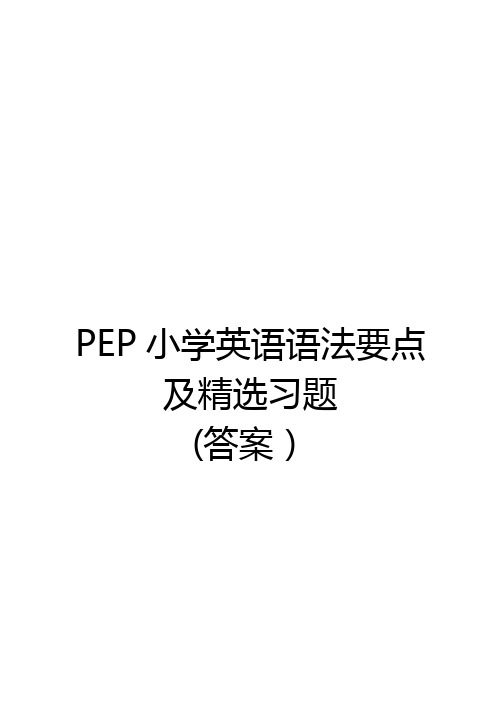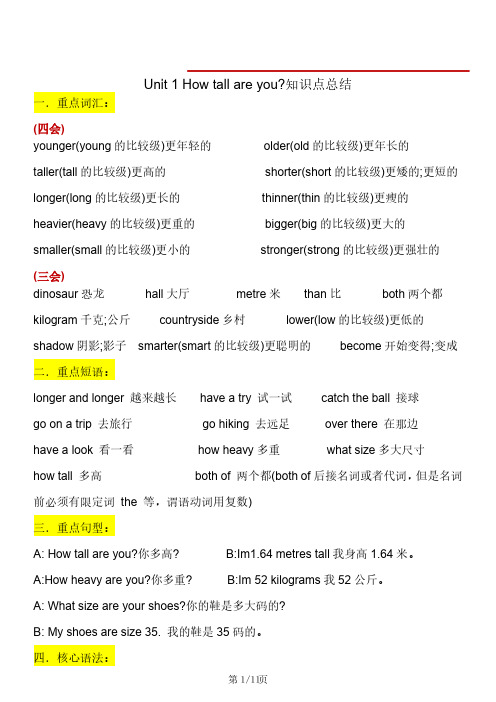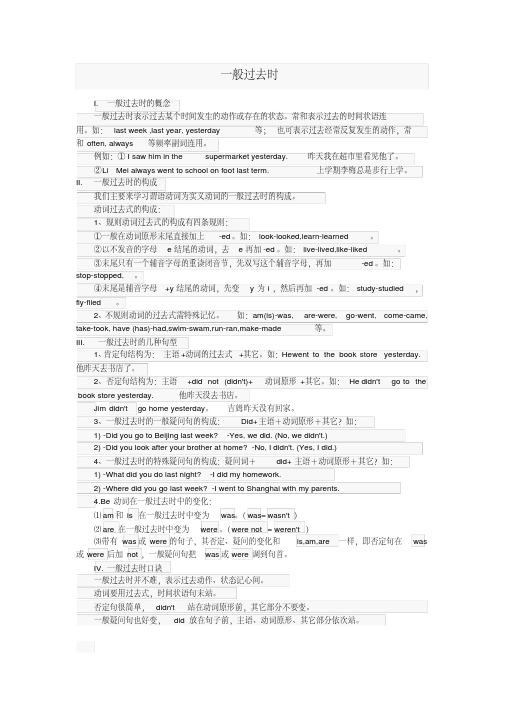【英语语法】《PEP小学英语》动词(短语)原形+过去式汇总
小学英语语法一般过去时的用法

一般过去时的用法一、概念一般过去时表示过去某个时间发生的动作或存在的状态,常和表示过去的时间状语连用。
如:yesterday,yesterday morning,yesterday afternoon,yesterday evening,the day before yesterday(前天),last night,last week,last month,last year,a moment ago(刚才),just now(刚才),two days ago,a week ago,in 1990等。
如:I went to bed at eleven last night. 昨晚我11:00睡觉。
一般过去时也表示过去经常或反复发生的动作。
二、句式变化:1.表示过去某个时间里发生的动作,或过去经常或反复发生的动作。
(行为动词)肯定陈述句句型: 主语+ 动词过去式+其它。
I visited my uncle yesterday. 昨天我拜访了我的叔叔。
否定陈述句句型: 主语+didn’t + 动词原型+其它。
I didn’t visit my uncle yesterday.一般疑问句句型:Did + 主语+ 动词原形Did you visit your uncle yesterday肯定回答:Yes, 主语+ did.Yes, I did.否定回答:No, 主语+ didn’t.No, I didn’t.特殊疑问句句型:特殊疑问词+ did +主语+ 动词原形+其它What did you do yesterday2.表示某个时间里存在的状态.(系动词be)肯定陈述句句型:主语+ be过去式(was/were)+其它。
They were in the classroom just now.否定陈述句句型: 主语+ be的过去式+not(wasn’t/weren’t)+其它。
They weren’t in the classroom just now.一般疑问句句型:Was/Were + 主语+ 其它Were they in the classroom just now肯定回答:Yes, 主语+ was/were.Yes, they were.否定回答:No, 主语+ wasn’t/weren’t.No, they weren’t.特殊疑问句句型:特殊疑问词+ was /were+主语+其它Where were they just now三、动词过去式的构成规律(一)规则动词的过去式1.以不发音e结尾的动词,在词尾直接加-d;live→lived use→used taste-tasted 2.以“辅音字母+ y”结尾的动词,先将y 改为i ,再加–ed;study→studied, tr y→tried fly→flied3.以重读闭音节(即辅音+元音+辅音)或r音节结尾,末尾只有一个辅音字母的动词,要先双写这个辅音字母后,再加–ed。
(完整版)小学英语语法_四大时态(最新整理)

四大时态复习1. 一般现在时(1)一般现在时的构成(肯定句)☆ be动词:主语+be(am,is,are)+其它。
如:I am a boy.我是一个男孩。
☆行为动词:主语+行为动词(+其它)。
如:We study English.我们学习英语。
☆当主语为第三人称单数(he, she,it)时,要在动词后加"-s"或"-es"。
如:Mary likes Chinese.玛丽喜欢汉语。
(2)一般现在时的变化☆ . be动词的变化。
[否定句]:主语+ be + not +其它。
如:He is not a worker.他不是工人。
[一般疑问句]:Be +主语+其它。
如:-Are you a student? -Yes. I am. / No, I'm not.[特殊疑问句]:疑问词+一般疑问句。
如:Where is my bike?☆ .行为动词的变化。
[否定句]:主语+ don't( doesn't ) +动词原形(+其它)。
如:I don't like bread.当主语为第三人称单数时,要用doesn't构成否定句。
如:He doesn't often play.[一般疑问句]:Do( Does ) +主语+动词原形+其它。
如:- Do you often play football?- Yes, I do. / No, I don't.当主语为第三人称单数时,要用does构成一般疑问句。
如:- Does she go to work by bike? - Yes, she does. / No, she doesn't.[特殊疑问句]:疑问词+一般疑问句。
如:How does your father go to work?*动词+s的变化规则1.一般情况下,直接加-s,如:cook-cooks, milk-milks2.以s. x. sh. ch. o结尾,加-es,如:guess-guesses, wash-washes, watch-watches, go-goes 3.以“辅音字母+y”结尾,变y为i, 再加-es,如:study-studies2. 现在进行时(1)一般现在时的构成:be(am,is, are)+ 动词的ing形式。
PEP小学英语语法要点及精选习题-答案

一、写出下列动词的现在分词:
play_playing_run__running__swim __swimming__make__making___
go___going___ski__skiing___
read_reading_have__having__sing __singing___dance_dancing__
3.What are you doingin the playground?
4.What isTomdoing in his study?
四、一般将来时
一、填空。
1。我打算明天和朋友去野炊。
Iamgoingtohave a picnic with my friends。
Iwillhave a picnic with my friends。
come - camehave - hadeat - atetake - took
run - ransing - sangput - putmake - made
read - readwrite - wrotedraw - drewdrink - drank
fly - flewride - rodespeak - spokesweep - swept
19. Davidwill givea puppet show next Monday.
20. Iis planningfor my study now
五、一般过去时
am,is - wasare - weredo - didsee - saw
say - saidgive - gaveget - gotgo - went
looklooksdrawdrawsdropdropsgivegives
专题7 动词和动词短语(共25张PPT) 2025年中考英语语法专题复习

考点解读
助动词 助动词本身无意义或意义不完全,不能单独作谓语。助动词在句中和实义 动词或系动词一起构成谓语,表示时态、语态、人称和数。
考点解读
助动词
助动词
用法
构成现在进行时(am/is/are+ 现在分词)
构成过去进行时(was/were+ 现在分词) be
构成一般将来时和过去将来 时 (am/is/are/was/were) going to
专题七 动词和动词短语
目录
1
CONTENTS
2
图解语法 考点解读
01
图解语法
专题七
图解语法
02
考点解读
专题七
考点解读
动词的基本形式
动词有五种基本形式:原形、第三人称单数形式、过去式、过去分词和现
在分词。
原形→第三人称单数形式
规则
示例
一般在词 work→works 尾加-s learn→learns
原形→过去式/过去分词 (规则变化)
规则
示例
一般在
词
work→worked
尾加- stay→ stayed ed源自原形→现在分词规则
示例
一般在词 wait→waiting
尾直接加 sleep→
-ing
sleeping
考点解读
动词的基本形式
原形→第三人称单数形式
原形→过去式/过去分词 (规则变化)
A lot of birds are protected in nature parks.许多鸟在自然公园受到保护。
考点解读
助动词
助动词
用法
构成疑问句和否定句
do 代替上文出现过的动词
小学英语不规则动词汇总表(超全)这样分类更好记

began
begun
开始
drink
drank
drunk
喝
sing
sang
sung
唱
swim
swam
swum
游泳
ring
rang
rung
打电话
原形→过去式→过去式+(e)n
原形
过去式
过去分词
汉语意思
wear
wore
worn
穿
forget
forgot
forgotten
忘记
speak
spoke
spoken
误解
shoot
shot
shot
放炮;开枪
understand
understood
understood
理解
AAB型
原形
过去式
过去分词
汉语意思
beat
beat
beaten
打败
有两种形式
原形
过去式
过去分词
汉语意思
bear
bore
born
生
bore
borne
hang
hanged
hanged
吊死
hung
hung
| 语文 • 数学 • 英语 • 道法 • 教师 • 学生 • 家长 |
英语中有许多不规则动词,他们不能简单通过加-ed来获得过去式,你知道的这些不规则动词有哪些呢?看看下面的不规则动词变化大全,查漏补缺吧!
AAA型(原形→原形→原形)
原形
过去式
过去分词
汉语意思
read
read
read
读
cut
1.24《六年级下册英语单元知识点总结》六下英语【人教PEP版】

Unit 1How tall are you?知识点总结dinosaur 恐龙hall 大older(old 的比较级)更年长的shorter(short 的比较级)更矮的;更短的thinner(thin 的比较级)更瘦的bigger(big 的比较级)更大的stronger(strong 的比较级)更强壮的厅metre 米than 比both 两个都kilogram 千克;公斤countryside 乡村lower(low 的比较级)更低的shadow 阴影;影子smarter(smart 的比较级)更聪明的become 开始变得;变成二.重点短语:longer and longer 越来越长have a try 试一试catch the ball 接球go on a trip 去旅行go hiking 去远足over there 在那边have a look 看一看how heavy 多重what size 多大尺寸how tall 多高both of 两个都(both of 后接名词或者代词,但是名词前必须有限定词the 等,谓语动词用复数)三.重点句型:A:How tall are you?你多高?B:Im1.64metres tall 我身高1.64米。
A:How heavy are you?你多重?B:Im 52kilograms 我52公斤。
A:What size are your shoes?你的鞋是多大码的?B:My shoes are size 35.我的鞋是35码的。
四.核心语法:younger(young 的比较级)更年轻的taller(tall 的比较级)寒假预习六下英语知识点总结一.重点词汇:(四会)更高的longer(long 的比较级)更长的heavier(heavy 的比较级)更重的smaller(small 的比较级)更小的(三会)本单元我们要学习形容词比较级的用法。
小学英语语法一般过去时

一般过去时I. 一般过去时的概念一般过去时表示过去某个时间发生的动作或存在的状态。常和表示过去的时间状语连用。如: last week ,last year, yesterday等;也可表示过去经常反复发生的动作,常和often, always等频率副词连用。例如:①I saw him in the supermarket yesterday. 昨天我在超市里看见他了。②Li Mei always went to school on foot last term. 上学期李梅总是步行上学。II. 一般过去时的构成我们主要来学习谓语动词为实义动词的一般过去时的构成。动词过去式的构成:1、规则动词过去式的构成有四条规则:①一般在动词原形末尾直接加上-ed。如:look-looked,learn-learned。②以不发音的字母e结尾的动词,去e再加-ed。如:live-lived,like-liked。③末尾只有一个辅音字母的重读闭音节,先双写这个辅音字母,再加-ed。如:stop-stopped,。④末尾是辅音字母+y结尾的动词,先变y为i,然后再加-ed。如:study-studied,fly-flied。2、不规则动词的过去式需特殊记忆。如:am(is)-was, are-were, go-went, come-came, take-took, have (has)-had,swim-swam,run-ran,make-made等。III. 一般过去时的几种句型1、肯定句结构为:主语+动词的过去式+其它。如:He went to the book store yesterday. 他昨天去书店了。2、否定句结构为:主语+did not (didn't)+动词原形+其它。如:He didn't go to the book store yesterday. 他昨天没去书店。Jim didn't go home yesterday。吉姆昨天没有回家。3、一般过去时的一般疑问句的构成:Did+主语+动词原形+其它?如:1) -Did you go to Beijing last week? -Yes, we did. (No, we didn't.) 2) -Did you look after your brother at home? -No, I didn't. (Yes, I did.) 4、一般过去时的特殊疑问句的构成:疑问词+did+主语+动词原形+其它?如:1) -What did you do last night? -I did my homework. 2) -Where did you go last week? -I went to Shanghai with my parents. 4.Be动词在一般过去时中的变化:⑴am和is在一般过去时中变为was。(was=wasn't)⑵are在一般过去时中变为were。(were not=weren't)⑶带有was或were的句子,其否定、疑问的变化和is,am,are一样,即否定句在was或were后加not,一般疑问句把was或were调到句首。IV.一般过去时口诀一般过去时并不难,表示过去动作、状态记心间。动词要用过去式,时间状语句末站。否定句很简单,didn't 站在动词原形前,其它部分不要变。一般疑问句也好变,did放在句子前,主语、动词原形、其它部分依次站。特殊疑问句也简单,疑问词加一般疑问句记心间。最后一条请注意,动词过去式要牢记。
小学英语时态大全表格

小学PEP英语四种时态总结一、一般现在时标志词:always(总是) usually(通常) often(经常) sometimes(有时) never(从不) every(每一)行为动词词型变化形式一般现在时动词只有第三人称后有词形变化,其他人称(第一人称:I, we;第二人称:you;第三人称复数:they、my friends)动词均用原形当主语是第三人称单数时,一般动词在一般现在时句子中的变化规律:1、多数在动词后加s play—plays like—likes ,2、以s,x,sh,ch,o结尾的动词加es wash–washes catch–catches do–does3、以辅音字母加y结尾,把y改i再加es fly—flies study—studies4、以元音字母加y结尾,直接加s buy – buys5、不规则变化have—has一般现在时基本用法功能1.表示事物或人物的特征、状态。
如:The sky is blue.天空是蓝色的。
2.表示经常性或习惯性的动作。
如:I get up at six every day.我每天六点起床。
3.表示客观现实。
如:The earth goes around the sun.地球绕着太阳转。
The earth is round.构成1. be动词:主语+be(am,is,are)+其它。
如:I am a boy.我是一个男孩。
2.行为动词:主语+行为动词(+其它)。
如:We study English.我们学习英语。
句型肯定句:A.be动词:主语+ be + 其它成分He is a worker.B.行为动词:主语+动词(注意人称变化) +其它成分We like the little cat.否定句:A.be动词:主语+ be + not +其它成分They are not students.B.行为动词:主语+助动词(do/does) + not +动词原形+其它成分We don’t like the little cat.一般疑问句:A.be动词:Am / Is /Are +主语+ 其它成分Are you a teacher? Yes, I am. / No, I am not.Are they students of your school.Yes they are / No they aren,t.B.行为动词:助动词(Do/Does)+主语+动词原形+ 其它成分Do you like it? Yes, I do. / No. I don’t .Does he(she) like it? Yes, he( she )does. / No, he ( she )doesn’t.特殊疑问句:疑问词+ 一般疑问句A.be动词:How many students are there in your school?B.行为动词:What do you usually do on Sunday?一般现在时动词be和have的变化形式1.动词Be 叫连系动词, 用法:第一人称单数用am,第三人称单数用is,其它人称用are。
- 1、下载文档前请自行甄别文档内容的完整性,平台不提供额外的编辑、内容补充、找答案等附加服务。
- 2、"仅部分预览"的文档,不可在线预览部分如存在完整性等问题,可反馈申请退款(可完整预览的文档不适用该条件!)。
- 3、如文档侵犯您的权益,请联系客服反馈,我们会尽快为您处理(人工客服工作时间:9:00-18:30)。
三年级上册
go- went 去
look-looked 看
eat-ate吃
三年级下册
meet-met 遇见
see-saw 看
come-came 来
watch-watched 观看draw-drew 画画
jump-jumped跳
open-opened 打开taste-tasted 品尝
play-played 玩
feed-feed(fed)喂养
四年级上册
go-went 去
please-pleased 请have-had 吃
pass-passed 传递
use-used 使用
四年级下册
run-run 跑
get up-got up 起床
go to school-went to school 去学校go home-went home 回家
go to bed-went to bed 上床睡觉wear-wore 穿
put on-put on 穿上
close-closed 关
want-wanted想要
take-took 买
五年级上册
know-knew 知道
fun-funned 逗笑
wait-waited 等待
do homework-did homework 写作业watch-TV-watched TV 看电视
read books-read books 看书
play-computer-did housework 做家务
cook the meals-cooked the meals 做饭
empty the trash-emptied the flowers 浇花
sweep the floor-swept the floor 扫地
clean the bedroom-打扫教室
wash the windows-washed the windows 擦窗户make the bed-made the bed铺床
set the table-set the table 摆饭桌
wash the clothes-washed the clothes 洗衣服
do the dishes-did the dishes 洗碗碟
put away the clothes-put away the clothes收拾衣服play chess-played chess 下棋
tell-told 说
work-worked 工作
use a computer-used a computer 使用计算机have a try-had a try 试一试
五年级下册
do morning exercises -did morning exercises 晨练eat breakfast-ate breakfast 吃早饭
have English class-had English class 上英语课play sports-played sports 进行体育运动
eat dinner-ate dinner 吃晚饭
climb mountains-climbed mountains 爬山
go shopping-went shopping 购物
go hiking-went hiking 去远足
play the piano-played the piano 弹钢琴
visit grandparent-visited grandparent 看望(外)祖父母fly kites-flew kites 放风筝
plant trees-planted tress 种树
make a snowman-made a snowman 堆雪人
swim-swan 游泳
skate-skated 滑冰
sleep-slept 睡觉
draw pictures-drew pictures 画画
cook dinner-cooked dinner 做饭
read a book-read a book 看书
answer the phone-answered the phone 接电话
listen to music-listened the music 听音乐
clean the room-cleaned the room 打扫房间
write a letter-wrote a letter 写信
write an e-mail-wrote a letter 写电子邮件
fly-flew 飞
jump-jumped 跳
run-ran 跑
climb-climbed 往上爬
fight-fought 打架
swing-swang 荡秋千
take-took 讲话
drink water-drank water喝水
send-sent 寄
take picture-took pictures 照相
watch insects-watched insects 观察昆虫pick up leaves-picked up leaves 采摘树叶do an experiment-did an experiment 做实验catch butterflies-caught butterflies 捉蝴蝶count leaves-collected leaves 收集树叶write a report-wrote a report 写报告
play chess-played chess下棋
六年级上册
go to school-went to school 上学
stop-stopped 停
get to-got to到达
find-found 寻找
remember-remembered 记住
mean-meant 意思是
drive-drove 驾驶
buy-bought 购买
turn-turned 转弯
get off-got off 下车
ride a bike-rode a bike 骑自行车
dive-dived跳水
live-lived 居住
teach-taught 教
go-went 去
play the violin-played the violin 拉小提琴make kites-made kites 制作风筝
collect stamps-collected stamps 集邮design-designed 设计
say-said 说
六年级下册
Think-thought 思考
study-studied 学习
kick-kicked 踢
bounce-bounced 反弹
go swimming-went swimming 游泳
go fishing-went fishing 钓鱼
study-studied 学习
learn-learned 学习
sing-sang唱歌
dance-danced 跳舞
row-rowed 划(船)
go skiing-went skiing 去滑雪
leave-left 离开
hear-heard 听见
trip-tripped 旅行
have a fever 发烧
hurt-hurt 疼痛
have a cold-had a cold 伤风
have a toothache-had a toothache 牙疼have a headache-had a headache 头疼have a sore throat-had a sore throat 喉咙疼。
